Search Images
Browse Content (p. 781)
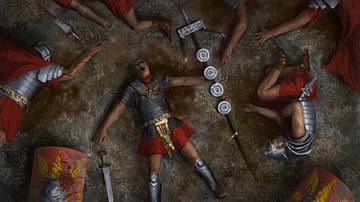
Image
Roman Defeat
Artist's impression of a Roman defeat.
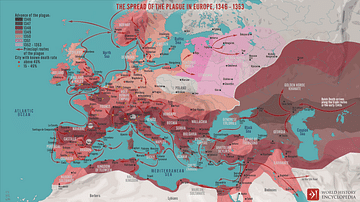
Image
The Spread of the Plague in Europe, 1346 - 1353
A map illustrating the rapid spread of the 14th-century plague pandemic commonly known as the "Black Death", across Europe and the Middle East. The second such pandemic (after the 541 - 549 outbreak during the reign of the Roman emperor Justinian...

Image
Danse Macabre in St. Mary's Church, Beram
"Dance of the Dead" fresco from the Church of St. Mary in Beram, Croatia. Painted by Vincent of Kastav, 1471. Artwork depicting the "Danse Macabre" motif became popular in Europe after the Black Death.
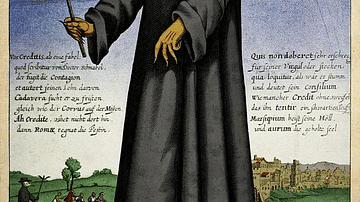
Image
17th-century Depiction of Plague Doctor
A depiction of "Doctor Schnabel" ("Schnabel" is literally German for "Beak"), a plague doctor in Rome. The illustration appeared in a 17th -century German satirical manuscript. The engraving was first published by Paul Fürst (1608–1666...
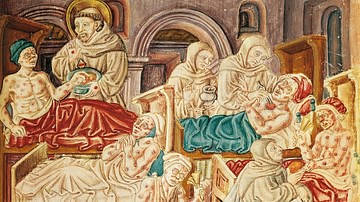
Image
Franciscan Monks Treat Victims of Leprosy
15th Century CE depiction of Franciscan monks treating people suffering from leprosy.
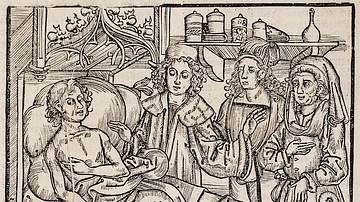
Image
Three Doctors Attend a Man with the Plague
Woodcutting of a plague-stricken man lying in bed, attended by three physicians. From the Pestbuch, a 16th Century CE medical treatise by Hieronymous Brunschwig (c. 1450-1512 CE). (Courtesy of the Historical Medical Library of The College...

Image
Citizens of Tournai Bury Their Dead
Miniature from a folio of the Antiquitates Flandriae, depicting the citizens of Tournai, Belgium burying those who died of plague during the Black Death. By Pierart dou Tielt (c. 1340-1360 CE). Made c. 1353. (Royal Library of Belgium)

Image
Plague in an Ancient City
"Plague in an Ancient City" by Michiel Sweerts (1618-1664 CE) is believed to depict the Plague of Athens (430-427 BCE). Oil on canvas. Painted c. 1652-1654 CE. 118.7 cm (46.7 in) x 170.8 cm (67.2 in). (Courtesy of Los Angeles County Museum...

Image
The Triumph of Death
"The Triumph of Death" (Dutch: "De triomf van de Doods") is a painting by Dutch artist Pieter Bruegel the Elder (c. 1525-1569 CE). Oil on panel. Made c. 1562 CE. 117 cm × 162 cm (46 in × 63.8 in). (Museo del Prado, Madrid)
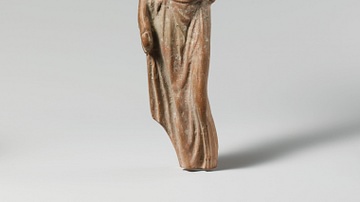
Image
Greek Statuette of an Emaciated Woman
A Greek statuette of an emaciated woman from Smyrna, Asia Minor. The woman depicted has an emaciated, skeletal frame and distended belly. Her pose, dress, and youthful hairstyle indicates that she is a young woman suffering from a debilitating...